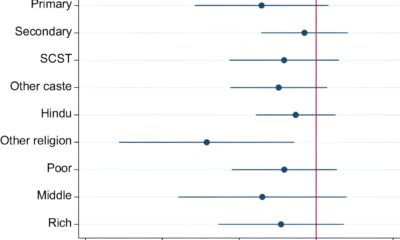Health
Phase 2 study shows that Opdivo-Yervoy is highly effective against colon cancer

Medical illustration of colorectal cancer.
A four-week course of double immunotherapy before surgery is very effective in treating a certain type of non-metastatic colorectal cancer, according to researchers from the Netherlands Cancer Institute in Amsterdam – the Antoni van Leeuwenhoek Hospital –found it. Remarkably, the treatment proved to be effective for almost all patients; in two-thirds of them, the tumors disappeared completely more than two years after the first treatment was given. Researchers published their findings this week in the New England Journal of Medicine.
The treatment consisted of two cycles of immunotherapy before surgery for patients with colon cancer with a specific genetic makeup known as mismatch repair deficient or microsatellite unstable. The phase 2 study included 111 patients with non-metastatic, locally advanced and previously untreated dMMR colorectal cancer. They were treated with the monoclonal antibodies Opdivo (nivolumab) and Yervoy (ipilimumab).
At the time of surgery, 95% of patients had 10% or fewer cancer cells remaining and 68% had no remaining viable tumor cells.
Patients have now been followed by doctors in the study for more than two years. Further follow-up will take place and patients will be examined three years after treatment to see if the endpoint of disease-free survival is achieved at that point.
Earlier this year, Opdivo’s manufacturer, Bristol Myers Squibb, announced results evidence indicating successful treatment of patients with metastatic dMMR colon cancer.
In both non-metastatic and metastatic cancer patients, the cancer cells were cleared by the body’s own immune system. Immunotherapies activate the human body’s immune system to fight cancer. They help recognize, attack and destroy cancer cells. In addition to greater efficacy, experts say a major benefit of such treatments is that patients tend to tolerate them better than chemotherapy.
The Dutch news site NOS describes the Phase 2 results for the non-metastatic colon cancer patients as groundbreaking. Lead researcher, internist and gastrointestinal oncologist Myriam Chalabi suggests that “this treatment could be a game-changer.”
Patients with dMMR tumors represent approximately 10 to 15% of patients with non-metastatic colon cancer. In this subgroup of patients, the effectiveness of chemotherapy is quite limited and is estimated at only 5%. And so the effectiveness of dual immunotherapy appears to be much better than chemotherapy prior to surgery.
This specific form of colon cancer contains numerous errors in its DNA, which actually allows the immune system to detect tumor cells. In turn, the immune system goes to work and can successfully eliminate tumor cells.
Colon cancer is not the only cancer targeted by dual immunotherapy, nor is it the only cancer that Antoni van Leeuwenhoek focuses on. At the annual meeting of the American Society of Clinical Oncology this week, researchers from the Institute presented a Phase 3 study demonstrated that event-free survival at 12 months was 83.7% for melanoma patients who received the Opdivo-Yervoy combination therapy, compared to 57.2% for those who received adjuvant treatment alone.
In addition, researchers presented promising results this week at ASCO from a late-stage study evaluation of Opdivo plus Yervoy as first-line treatment for liver cancer.
Double immunotherapy is promising for several types of cancer. And especially for patients with non-metastatic dMMR colorectal cancer, the latest findings offer reasons to be optimistic.













